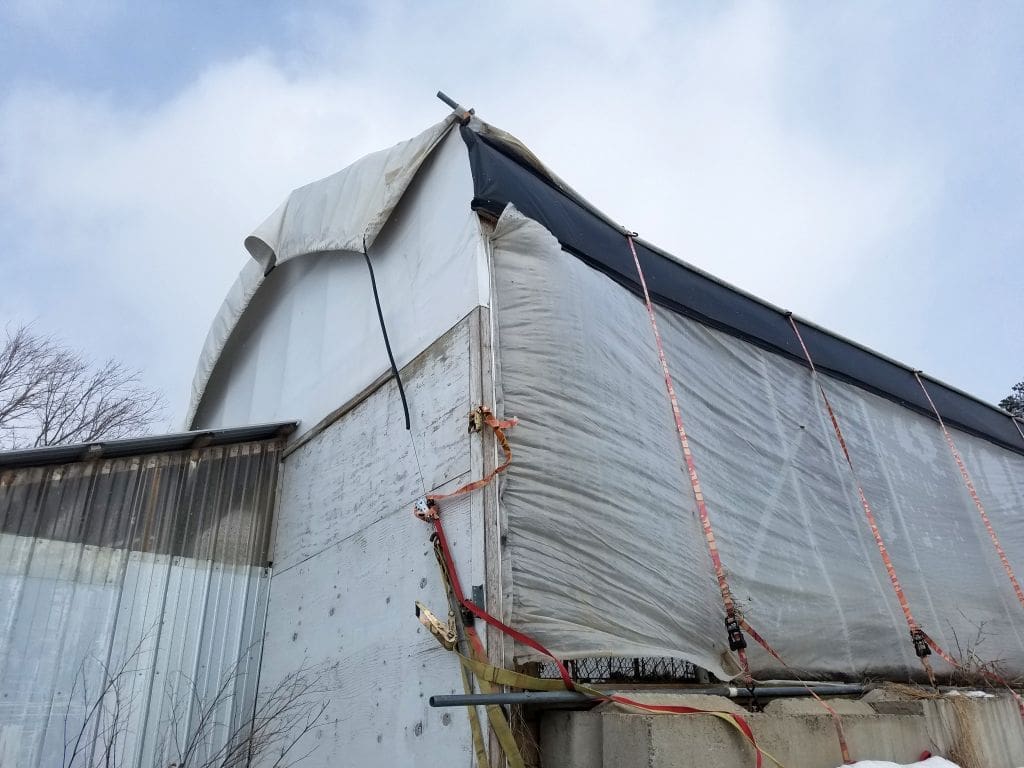“You give me much good counsel,” he said aloud. “I’m tired of it.”
Ernest Hemingway, The Old Man and the Sea
The hoophouse roof was whipping in the wind and the building’s framework hummed and shuddered while I held onto the corner of the tarp, scrabbling to keep my feet under me, to prevent the roof lifting me with it. I had the end of a parted anchor cable wrapped around my hand. I could feel capillaries busting in my finger tips, but after a few minutes the loss of circulation made my hand go numb. If I released the cable, the entire covering was liable to tear free as the wind would sequentially overload each of the anchors down the line.
“Be patient, hand,” he said. “I do this for you.”
I had arrived home from a trip to the hardware store to find the cover of pigs’ hoophouse torn free from its anchors. The windward side was billowing up several feet above the metal framework. The nearest weather observation point in Hessville shows that the wind at that time was gusting up to 70 mph and holding steady around 35-40 mph. I ran into the house to call Rachel and then grabbed a handful of straps and some fence wire, and rushed back out.
“I may not be as strong as I think,” the old man said. “But I know many tricks and I have resolution.”
Once Rachel came out we worked together to slip a ratcheting cargo strap around the end of the cable and we winched the tarp back down. It isn’t a repair that is certain to hold, and this storm is still blasting us with stronger winds forecast overnight. But it is battened down for now.
The wind is our friend, anyway, he thought. Then he added, sometimes.
Santiago’s monologues in The Old Man and the Sea resonate with our experiences farming. We end up in ridiculously lopsided scenarios, faced with elemental forces. We identify with his predicament, poking around the bottom of the skiff trying to kill a shark with just a fishing knife and some scraps of wood.
Now is no time to think of what you do not have. Think of what you can do with what there is.
As hard as it is to face these situations, there is an exhilaration from having improvised a way out of a near-disaster. Avoiding near-disasters altogether might be a wiser way to live, but I haven’t learned the knack of doing that yet.
I think the Great DiMaggio would be proud of me today.


9 thoughts on “The Old Man and the Sea, and Me”
You’re not only a good and determined farmer, you have a knack for storytelling as well.
Nicely done!
So true! Are we good in a crisis? We should be. As livestock farmers, it seems we practice every week.
Seems to work that way…
Although this winter I’m focusing specifically on building better systems to avert some of the self-inflicted problems. I can’t fix the whole farm at once, so I’m concentrating on the broiler chickens since they are also the area of our biggest growth. I believe that with a combination of planning and investment I can get ahead of some of the problems we faced last year. I have no illusions that it will be smooth sailing, but I know I need to make things better.
Dave and Rachel, you are my heroes.
What a remarkable and, yes, beautiful use of Hemingway’s old man’s voice of wisdom. I read this having just run a whole block down Otsego Street, corralling my two garbage cans that had flown the coop (see how I’m trying to use some farm jargon), and my hat is (blown) off to you. Damn. I am a fan. Wishing you well as the winds die down, and will look forward to regularly following your fine written and farm work.
That’s funny, my hat was blown away too. It is probably down by Otsego Street by now. It was last seen sailing away in the direction of the village.
I love your posts! You write so beautifully.
So do I — these are classically wonderful journal entries, and I feel so lucky to have found my way here after taking a walk past the farm a few weeks ago. Thinking of you with greatest admiration and wowser, Alice in Canajoharie
That’s great. Stop by some time. You’ve already seen the farm so you know we’re not much for looks, but we enjoy meeting new people.
Thanks Deb… Rachel can attest my language wasn’t exactly lyrical in the moment.